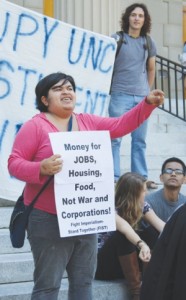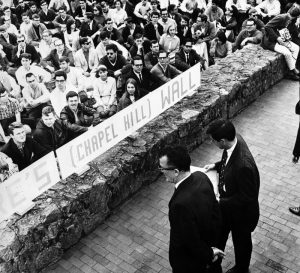
As a graduate student, I feel a bit removed from student organizations, but yesterday I talked with some students with a banner and a loud boombox right outside of Wilson Library entreating the University to “Occupy UNC.”
Activism at the University of North Carolina has a long history, and the University Archives hold records from a variety of different political organizations. The 1960s are often seen as the most politically engaged period in UNC’s history—in the Jim Crow south, the liberal town of Chapel Hill was still at least partially segregated until at least 1964 (the University integrated in 1951, though in 1968 African-American students made up only one percent of the student body). Following the successful student integration movement, strikes, pickets, public speaker displays, and anti-war protests rounded out the tumultuous decade.
In 2007, Wilson Library mounted the excellent exhibit “I Raised My Hand to Volunteer: Student Protests in 1960s Chapel Hill.”

The exhibit tracked the decade through primary and secondary source materials from the point of view of the students who fought for equal rights, equal opportunities, and against war and bigotry.
Though the 1960s are an obvious starting point for people researching student activism at North Carolina, University Archives holds the records of several other activist organizations, from the Anti-Apartheid Support Group, founded in 1985, to the Student Consumer Action Union of 1972, to the Campus Y, which has served student activists for over 150 years.

Relevantly, the University Archives assisted in the erection of a marker to a student-led protest that led to a major change in university policy. From 1963 to 1968, individuals who were Communist were forbidden from speaking on University of North Carolina campuses due to a bill called the “Speaker Ban” passed by the North Carolina State Legislature. In 1968, due largely to student pressure, the bill was overturned, but not without an exciting series of events. Read more about it here. Tomorrow, University Day, will see the unveiling of a marker on the spot where these dramatic events took place.
There will be another event tomorrow– “Occupy UNC” is holding a student speakout on the steps of Wilson Library tomorrow, which seems fitting! From Speaking Bans to speaking-out, the University of North Carolina has seen a good deal of change over the past forty years, and student activists still lead the charge of positive waves of change, idealistically fighting for what they know is right.
